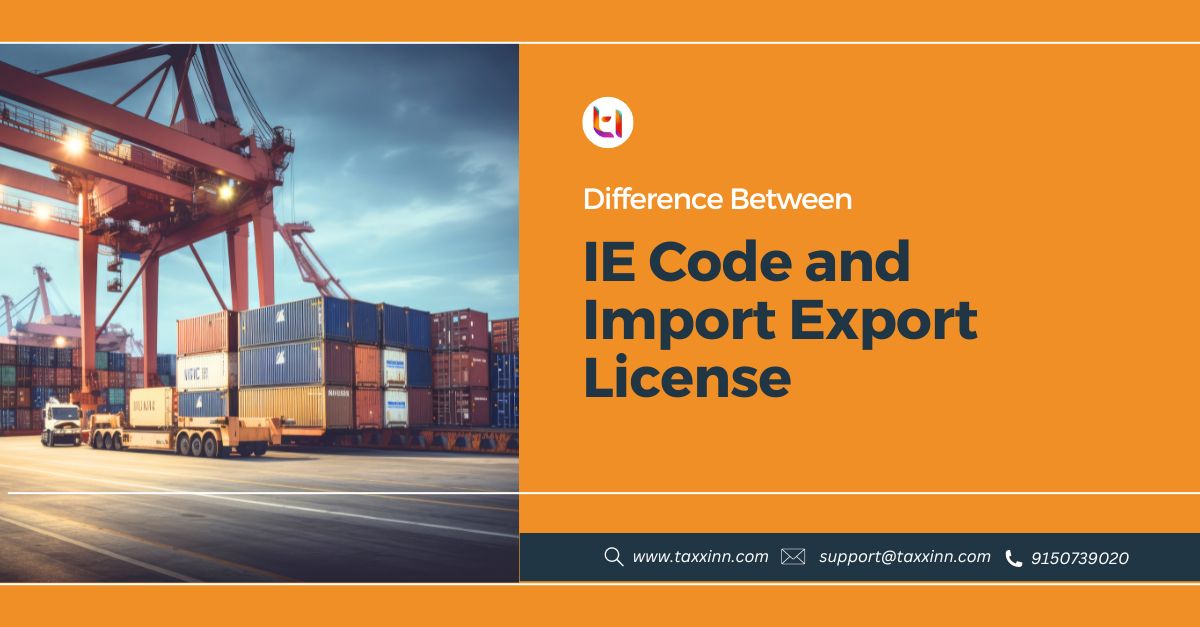In modern times, with a rapidly globalizing economy, trade between nations is crucial for promoting economic growth and establishing cross-border corporate relationships. Whether you’re a business owner starting a company on the import-export market or a well-established corporation expanding your activities abroad, learning the rules and regulations is crucial. Two crucial terms—IE Code and Import Export License—often confuse businesses. Because the two ideas are related to international trade, they serve different purposes and cover different facets of the trading process. In this blog post, we go into great depth about the difference between IE Code and import export license.
Introduction to IE Code:
For importing and exporting goods from India, a unique 10-digit code called the Importer-Exporter Code (IEC) is required. This code is issued by the Director General of Foreign Trade (DGFT) and remains valid for the entire lifespan of the entity. Obtaining an IEC not only ensures the legal status of the entity but also enables it to explore new markets and expand its business horizons.
Importance of IEC:
1. Customs Clearance: Customs officials require an IE Code when an importer needs to clear shipments through customs.
2. Financial Transactions: Financial institutions require an IE Code when importers use banks to send money abroad for their transactions.
3. Port Clearance: Customs ports require an IE Code when a trader intends to dispatch shipments.
4. Banking Services: Banks require an IE Code to provide services such as receiving foreign currency directly into a trader’s bank account.
Introduction to Import-Export License:
The permissions or licenses required to engage in business with corporations or organizations located in other countries are known as import-export licenses. These licenses are necessary when bringing foreign goods into your country or selling local products abroad. Import-export licenses are designed to ensure that import and export activities comply with the law. The list of items requiring an import-export license is subject to change, so it is important to consult the official regulations and guidelines published by the DGFT for the most up-to-date information. However, the following popular categories of commodities typically require an import-export license: Controlled Substances, Strategic Goods, Agricultural Products, Precious Metals, and Stones, Electronics and IT Equipment, etc. In cases of significant criminal activity, the import-export license may be suspended, and severe penalties, such as imprisonment, may be imposed.
Import License Are Required For:
1. Customs Clearance: An import-export license is necessary when sending shipments through customs.
2. Financial Transactions: An import-export license is required if you intend to use a bank for transferring money to another country.
3. Receipt of Export Payments: To claim payments for exported goods transferred into your bank account, an import-export license is needed.
4. Customs Fee Payments: An import-export license is necessary for making payments towards customs fees.
5. Government Subsidies: If you wish to avail of certain government subsidies, an import-export license is required.
Difference between IE Code and Import Export License:
Meaning:
The Directorate General of Foreign Trade (DGFT) provides the IE Code (Import-Export Code) for business, which is a special 10-digit identification number that improves import and export procedures. On the other hand, A license that covers a wider range of rights and permissions needed for import and export operations is referred to as an “import-export license.”
Field:
IE code is mandatory for all people or firms engaged in either import or export activities, which is specially designed to identify the importer or exporter. On the other hand, A wider variety of privileges and licenses linked to import and export are covered by import-export licenses, such as IEC, Custom House Agent License, etc.
Legal Obligation:
Any individual or entity performing import or export activities in India is required to obtain an IEC code. Having the IEC code guarantees that you obey the law and prevents you from running violations of the law overall. However, an import-export license may be needed to import or export certain products or operations.
Authorising Agency:
Only DGFT can issue IE Code whereas the Import-Export Licences may be issued by a range of organizations, including the DGFT, customs officials, or additional relevant government entities.
Application Procedure:
The procedure for getting an IE Code requires filling out a web-based application form, submitting the required documentation, and depositing the appropriate fees. On the other hand, depending on the specific license or approval needed, the application process for an import-export license can vary and might require additional documentation like an EOU, which certifies that the products will be used for legal purposes and not illegal ones, might be required for certain goods and authorizations.
Validity:
The IE Code remains valid for a lifetime. In contrast, import-export licenses have a specific period of validity and may require renewal periodically.
Conclusion:
From the above-mentioned details, we came to know the difference between IE Code and Import Export license and both serve as gates for global commerce. Import-export licenses establish the necessary legal framework for engaging in import and export activities within a country. Recognizing these differences is crucial for conducting efficient global trade, ensuring compliance, mitigating risks, and minimizing potential issues. At Taxxinn, we offer assistance in applying the IEC code for your business, handling every bit from documentation to obtaining the IE code. Our professional team will make the journey hassle-free.
Related Reads:


